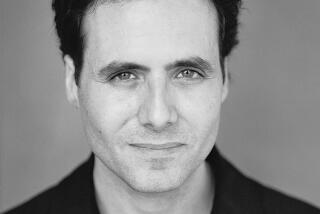BOOK REVIEW / NONFICTION : Evolution of a Controversial Victorian Scientist : CHARLES DARWIN: Voyaging <i> by Janet Browne</i> , Alfred A. Knopf, $35, 605 pages
- Share via
While Darwin’s theory of evolution still triggers heated debate in and outside the scientific community, few dispute its originality or brilliance. Darwin’s uncontested stature has inspired many biographers. Some examined his career as part of the history of science; others examined his corpse to explain the illnesses that plagued his middle years.
Now Janet Browne, an associate editor of the Darwin correspondence, has so mastered the details of his life that she can draw back and focus sharply on solving the riddle of how a bright but by no means remarkable youngster from a prominent middle-class English family could grow into one of the world’s most original thinkers. Browne’s Darwin is a lackluster student and aimless though clever youth who becomes a stubborn, ambitious man who sees a truth and then wrestles with it until he can present it to the world as a foolproof case.
Browne introduces us to Jane Austen’s rural Georgian society, into which Charles Darwin was born, and carries him into the complicated, urban Victorian world. The bridge between the carefree, adventurous country boy and the obsessed, methodical, mature scientist, Browne explains, was built during Darwin’s five-year voyage aboard the HMS Beagle. While mapping and exploring the flora, fauna and geology of the southern reaches of Latin America, Darwin became convinced that the Earth and its inhabitants had evolved over time.
Browne begins her book by examining the impact of Darwin’s mother’s death when he was 8. Others have interpreted this as the defining experience of Darwin’s life. Browne, however, makes a good case that while Darwin was clearly affected by witnessing the peritonitis that took his mother’s life (he claimed no memory of the event but suffered from lifelong stomach problems), he was in fact cosseted by loving sisters, a brother and a very rich father who provided material support for his children.
Contrary to popular opinion, Darwin’s father, Robert, a doctor, was richer than his brother-in-law, Josiah Wedgewood, to whom he lent money. Robert Darwin taught frugality by example but was never stingy. With no stepmother to muddy the waters, Darwin’s close family provided him with affection and attention throughout his life.
Browne stresses Darwin’s close relationship with his older brother, Erasmus, who shared his intellectual interests but had little personal ambition. His example, she suggests, may have been one of the prods to Charles’ own intense competitiveness, which was displayed, for the first time, in his ungenerous treatment of Capt. Fitzroy, who not only invited Darwin on the Beagle but also gave him access to his collection of bird skins from the Galapagos Islands when Darwin discovered his own specimens were inadequately labeled.
Before setting out on the Beagle, Darwin had abandoned his medical studies in Scotland and gone to Cambridge to study natural history. He was a very sociable student and a sportsman especially adept at shooting birds. No conservationist, he was your typical 19th-Century gentleman.
Darwin’s world, Browne reminds us, was not all hearty walks and good cheer. Born on Feb. 12, 1809, the same day as Abraham Lincoln, Darwin, too, was exposed to the horrors of a slave auction and was generally conflicted about the proper social place for non-Europeans. This was important to his later ideas on human evolution.
On one side of the equation was his respect for the freedman who taught him elementary taxidermy in Edinburgh, Scotland; on the other was the, to him, inexplicable behavior of the three Tierra Del Fuegians aboard the Beagle who, having been brought to England and taught “civilized manners,” reverted to nakedness when the Beagle returned them home. Brilliant as he was, Darwin could not escape the colonial, chauvinistic mind-set of his time.
Browne’s description of the Beagle’s voyage is fascinating, as is her account of Darwin’s bewildered re-entry into English life, a Rip Van Winkle in a world where everything and everyone had changed. Her voyage ends in 1856, three years before the publication of “Origin of the Species.” A promised second volume will cover Darwin’s later publications and years as a public figure.
Together with Freud and Einstein, Darwin is credited, or blamed, for the creation of 20th-Century culture. Of the three, Darwin alone wrote in English and represented and benefited from being a part of the society whose hierarchical nature he helped undermine.
“Masterpiece Theatre” has nothing on Janet Browne. This gracefully written biography will reward readers with a rich sense of the texture of Victorian life, including the psychological forces that drove Darwin to force his contemporaries to confront his vision.
More to Read
Sign up for our Book Club newsletter
Get the latest news, events and more from the Los Angeles Times Book Club, and help us get L.A. reading and talking.
You may occasionally receive promotional content from the Los Angeles Times.









